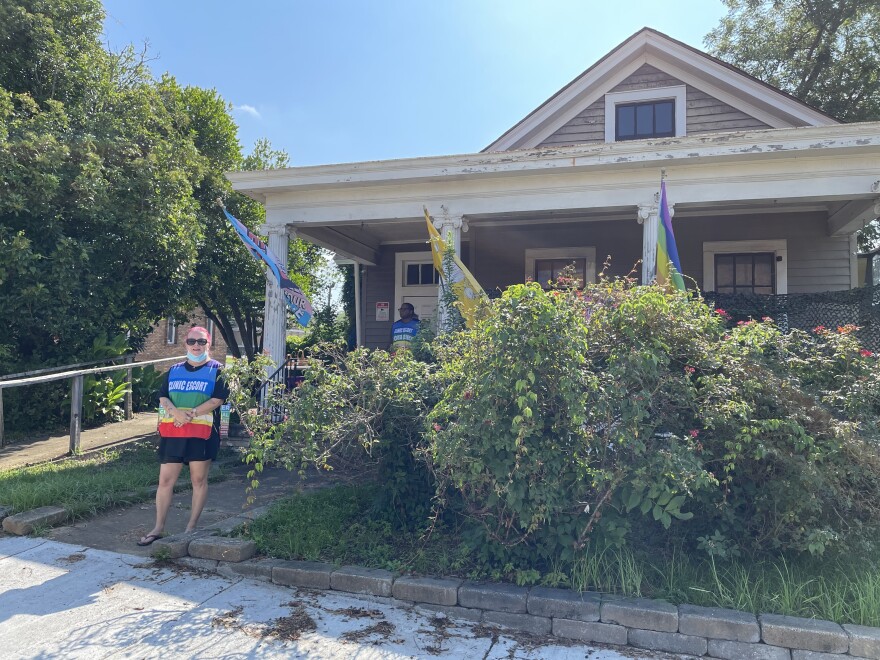MONTGOMERY, Ala. — The only clinic that performed abortions in Montgomery, Ala., closed last month, but a volunteer organization next door has been working to offer women at least some reproductive health care the clinic provided.
Some women have been coming from hundreds of miles away.
Alabama's law now limits abortion to cases where the mother's health is in danger, with no exceptions for rape or incest. The restriction went into effect after the Supreme Court's decision June 24 overturning Roe v. Wade.
Next door to Montgomery's shuttered clinic is an organization called the POWER House, which stands for People Organizing for Women's Empowerment & Rights and has been in operation since 2015.
The POWER House is located in a vintage Southern home with a big front porch. It seems idyllic, until you see the camouflage netting strung between the pillars to hide anyone sitting on the porch in big wicker chairs.
Mia Raven, the executive director, jokingly says most people have known her for years as "the abortion lady" because of her advocacy for reproductive rights in Alabama. Raven has a tattoo on her wrist that reads "Know Your Rights," and she has neon pink hair.
She says some protestors in front of the clinic had another nickname for her: "The Pink-haired Devil Lady."
In a recording Raven shared, a protestor says, "Hey, Mia, you doing alright? You need to repent and turn to Jesus and stop being evil and wicked, Mia."
Raven says she had to develop a thick skin because, "Our protestors are a special kind of ugly, and it's just hard."

Raven has been helping women seeking abortions for over a decade. In 2015, she was working as an escort at the reproductive health clinic in Montgomery when she heard that an Evangelical Christian group opposed to abortion rights planned to rent the house next door.
The distance between the two buildings is around 40-45 feet, and Raven remembers thinking about how close protestors would be able to get to patients.
"They could stand on the property line, and they could literally reach out and touch the hood of a patient's car," she says.
The idea of that happening was untenable to Raven. So she worked to persuade the landlord of the house next to the clinic to rent it to her, which he did.
She founded the POWER House and moved her patient-escort operations there. Next, she recruited more volunteers to get people from their cars to their abortion appointments.
Protestors would often yell at them and sometimes take their picture, but at least patients knew they were a safe distance away.
But it was tough on patients, so Raven and her staff developed tactics to shield them, like using giant umbrellas.
She demonstrates how they hold the umbrellas: "It's kind of like an umbrella dance, like a ballet dance, if you will, of just the way you walk with the umbrellas to shield that patient as much as you can."
She says they also wore rainbow-colored vests, which are copyrighted, so patients could distinguish them from protestors.

But now that Alabama's abortion ban is in effect and the clinic has closed, most of the protestors are gone. With no patients to escort, the POWER House has changed its mission.
A car pulls into the POWER House parking lot and Raven takes an order from a young woman in her car. Raven calls this new drive-thru service "pro-choice assistance."
She stands in front of baskets of items the program offers.
"We have Plan B," she says. "We have condoms, latex and non-latex. We have pregnancy tests. We have urine strips. We have water-based lube, and we also have hand sanitizer."
Plan B is emergency contraception that can prevent pregnancy after unprotected sex or the failure of another form of contraception.
According to Raven, the POWER House can provide all of this for free because donations have increased since the Supreme Court ruling. In the first few days of this month, POWER House volunteers handed out 28 packs of Plan B, 70 pregnancy tests and two dozen sheets that list the states where abortion is available.
Raven's lawyer says that's all they can do. In between cars, Raven reflects on the death threats and bomb scares she's experienced over the years.
"I used to joke that I never wanted to go through that again in my life," she says. "But if it meant that the clinic could be open and seeing patients as it always had, I would do it every single day."
And she says she'll continue to do it every single day she can as long as women need reproductive care.
Copyright 2022 NPR. To see more, visit https://www.npr.org.



